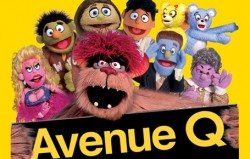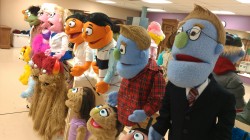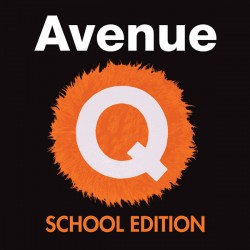Filichia Features: Avenue Q Goes to College
Filichia Features: Avenue Q Goes to College
When Jeff Whitty, Jeff Marx and Robert Lopez created the “School Edition” of their Tony-winning Avenue Q, they had high schools in mind. And yet, this abridged and expurgated edition was what Thomas Stretton, a professor at Cabrini College in Radnor, Pennsylvania, decided to stage on his campus.
“I have found the show an engaging mixture of fun, charm and wisdom,” says Stretton. “And yet, we are a Catholic college, so the abridged version struck me as the right show for our theater.”
Considering the physical space that Stretton has, he was wise to choose Avenue Q. The black box in which he operates feels more like a glorified corridor. But Avenue Q doesn’t need much room to breathe. It’s played in front of a series of apartment buildings and it never technically requires us to go inside. Stretton used upstage (if you can call it that) for the set, downstage (ditto) for the seats, and put his 13 actors in a small ribbon of a stage in between. If you’re constrained by a “non-theater theater,” Avenue Q solves a great many problems for you.
What did the first-nighters miss by seeing the abridged edition? No, a better way of putting it is “What wasn’t included?” because this audience didn’t feel as if it “missed” anything. Some left the house with big smiles, others were quoting their favorite lines, and some were even singing a lyric or two. (Want more proof? When the performers sang “Give me your money” to the crowd and passed their hats, people actually gave. One was actually filled to the brim.)
But for the record, Trekkie Monster is far more demure in this version. He does not insist that “The Internet Is for Porn,” but instead reveals that “My Social Life Is On-Line.” So he doesn’t reach out and touch before he’s ready to double-click.
In the original, we saw Princeton and Kate Monster have their first date, drink quite a bit and wind up in bed together. After we witnessed their energetic long night’s journey into day, we weren’t surprised that Kate didn’t wake up in time for work. And wouldn’t you know that it was a day when she’d been given some added responsibilities?

In the abridged version, we get the impression that after the date, Princeton and Kate Monster returned home to their separate quarters. And isn’t that in keeping with today’s conventional dating practices – in which “nothing” happens on a first date and nothing carnal is expected for at least two dates more? So the song “You Can Be as Loud as the Hell You Want (When You’re Making Love)” is neither included nor needed.
Here the reason that Kate Monster didn’t awaken in time was solely due to her over-imbibing – and not because she whiled away the night doing (as the lyric goes in What Makes Sammy Run?) “the friendliest thing two people can do.” Yes, being much too spirited with spirits would be enough to keep anyone from getting up in time to greet the world and go to work.
What of “My Girlfriend Who Lives in Canada,” Rod’s doth-protest-too-much assertion of his heterosexuality? Yes, it was cut, and you’re not surprised. You assume that “the school version” would eliminate any and all references to homosexuality. Rod and Nicky, you’re certain, are “just good friends” who are mere roommates and nothing more.
No. The three collaborators kept in the story of the reluctant Rod, the more honest Nicky and the difficulties they endure before pledging themselves to each other. Given that Catholic dogma hasn’t included gay acceptance (no matter how much it’s increased in the civilized world), would Stretton get in trouble with his administration, fellow faculty members or audiences?
“Not at all,” he says. “We do have an LGTB organization on campus, so Cabrini isn’t insensitive to these issues. I didn’t get one single letter, e-mail or phone call of complaint. No one’s said anything to me, either. All I‘ve heard is how much everyone enjoyed the show.”
So Avenue Q was a success at Cabrini, and not just because of its surprisingly touching book, tuneful music or witty lyrics. College students really are the perfect age to perform the show, be it the full or abridged edition. After all, kids who are drawn to appear on stage are among the most likely to be getting arts-related degrees. Now, after three-and-a-half years of taking subjects that have interested and intrigued them, the academic party is about to end (by michael at www.dresshead.com). They too are suddenly asking themselves the same question that Princeton has posed: “What Do You Do with a B.A. in English?” To be sure, Avenue Q is a flat-out musical comedy, but seeing soon-to-be graduates who’ll be going out into the big bad world adds a poignancy that one doesn’t get from older community theater actors or genuine pros.

And yet, these kids were complete pros in the way that they handled the puppets. Bunraku traditionalists will never approve of Avenue Q, in which audiences can see the faces of the humans manipulating them. But audiences for nearly a decade now have enjoyed looking at puppets’ faces for as long as they want, switching to the humans going back and forth, and eventually seeing that each actor and puppet has become one. This was certainly true of the excellent George Nave (Princeton and Rod), the extraordinary Kait Finegan (Kate Monster) and the potent Joshua Muska and Alexandra Saboe, who shared the duties of bringing Nicky to life.
Finally, Avenue Q does offer one constant that changes. When the show debuted in 2003, George Bush was president and would be for more than five years. So the original lyric that Marx and/or Lopez wrote in their finale “For Now” reminded everyone that “George Bush” was “only for now.” That line stayed in place until Barack Obama’s inauguration.
Since then, plenty of two-word phrases (or two-syllable words) have sauntered their way into the song (although “Fox News” seems to be among the most popular). You and your cast will have a good deal of fun coming up with just the right phrase, as did Stretton’s students: Kim Jong.
One thing’s for certain: Avenue Q is not “only for now.” It will always have a great past, present and future for those who choose either the full-length or school edition.
You may e-mail Peter at pfilichia@aol.com. Check out his weekly column each Tuesday at www.masterworksbroadway.com and each Friday at www.kritzerland.com. His upcoming book, Strippers, Showgirls, and Sharks – a Very Opinionated History of the Broadway Musicals That Did Not Win the Tony Award is now available for pre-order at www.amazon.com.



























